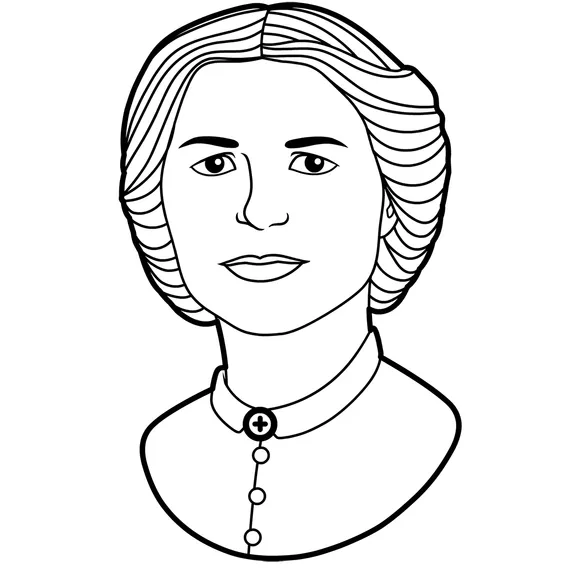Clara Barton
December 25, 1821

Clara Barton was an educator, nurse, patent clerk, author, and humanitarian. After years as a teacher, Barton became “Angel of the Battlefield” during the civil war, distributing supplies and nursing wounded soldiers. After the war, Barton ran the Office of Missing Soldiers and founded the American Red Cross. She was inducted into the National Women’s Hall of Fame in 1973 and the Government Executive’s Government Hall of Fame in 2019.
Clarissa (Clara) Harlowe Barton was born on December 25, 1821, in Oxford, Massachusetts. As the youngest of politician and militia Captain Stephen Barton and Sarah Barton’s five children. Barton’s first experience nursing was when she was 11 years old. Her brother, David, fell off the roof of a barn and had a head injury. Barton took care of him for two years, until he recovered.
In 1839, at age 18, Barton became a schoolteacher. She spent the next 12 years teaching in schools in Canada and West Georgia. At age 24, she founded a school for workers’ children at her brother’s mill. In 1852, Barton opened the first free school in New Jersey and built it up to over 600 students. She was soon replaced as principal by a man since the school-board considered it unfitting for a woman to run a large institution.
In 1854, Barton moved to Washington, D.C. and took a job as a clerk at the United States Patent Office. She was one of the earliest women to work for the federal government. In 1857, when James Buchanan became president, Barton was fired due to her anti-slavery stance. In 1861, after the election of Abraham Lincoln, Barton returned to the patent office as a temporary copyist.
In 1861, Barton dedicated her time to serving the wounded Union Army soldiers during the Civil War. She distributed medical supplies, offered emotional support, and provided food, clothing, and other supplies. In addition to being the “lady in charge” of the hospitals at the front of the Army of the James, she nursed soldiers on the front lines of war earning the nickname “Angel of the Battlefield” and “Florence Nightingale of America.” After the end of the Civil War, Barton ran the Office of Missing Soldiers, helping to locate more than 22,000 missing soldiers and bury and mark more than 23,000 Union Army graves.
Barton became associated with the women’s suffrage movement as well as becoming an activist for civil rights. In 1869, she traveled to Geneva, Switzerland where she met Dr. Appia and learned about the International Red Cross, which had established an international agreement known as the Geneva Treaty (now part of the Geneva Convention), which laid out rules for the care of the sick and wounded in wartime.
After returning to the United States, in 1873, Barton began work to create an American branch of the International Committee of the Red Cross, which would provide aid at times of natural disasters, crises, and wars. Barton petitioned for the U.S. to enter the Geneva Treaty and in 1882, President Chester A. Arthur signed the treaty. The American Association of the Red Cross (later named the American Red Cross) was created with Barton leading. She ran the American Red Cross Society for 23 years. In 1905, at the age of 84, she founded the National First Aid Society of America. In 1907, Barton published her autobiography, Stories of My Childhood.
Clara Harlowe Barton died on April 12, 1912, at age 91, at her home in Glen Echo, Maryland due to complications of pneumonia. In 1975, the National Park Service restored her house to create the Clara Barton National Historic Site. A museum was made of her house in Massachusetts as well as the office in which she worked for missing soldiers, Clara Barton’s Missing Soldiers’ Office. Today there are over 24 schools, ten streets, five clinics, and eight community centers that hold her name. Her story is recognized and depicted in various fictional and non-fictional written and visual works. Her words, “You must never so much think as whether you like it or not, whether it is bearable or not; you must never think of anything except the need, and how to meet it.”
Fact check: We love accuracy. If something looks incorrect, please contact us and let us know.
